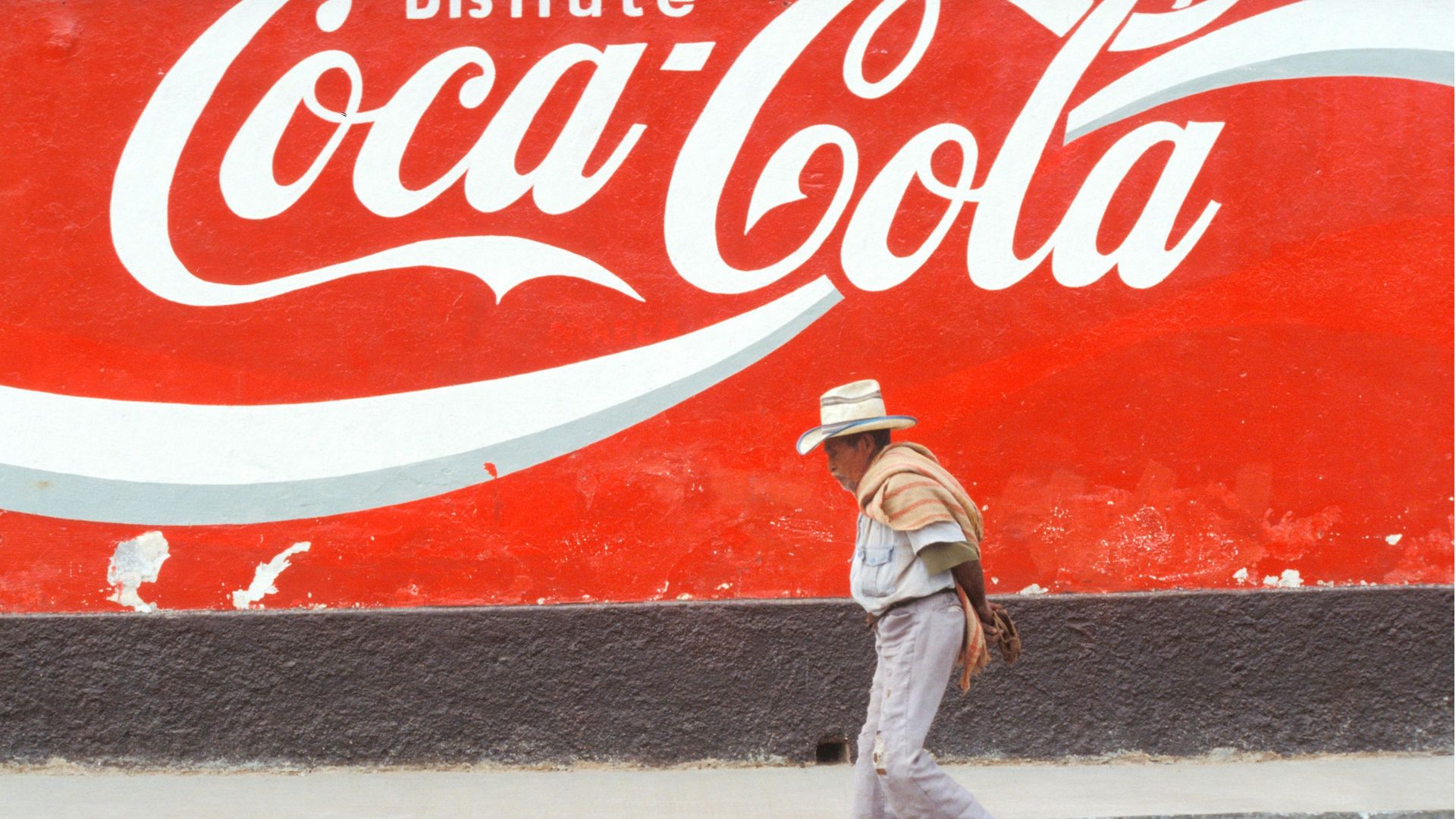
Mexican Coke is now on sale in the UK, but will it ever replace the real thing, with its iconic glass Coca-Cola bottles?
My uncle used to buttonhole the sommeliers in expensive restaurants and ask for “a bottle of American Beaujolais”. A so-called ‘Mad Man’ – or Madison Avenue advertising copywriter – he knew the value of a snappy slogan; or rather, as a sort of poet of late capitalism, he knew how to détourner – or hijack – one commodity’s aura and use it to enhance another’s lustre.
Not that this is how Coca-Cola has been most consistently euphemised – on the contrary, throughout most of my life the fizzy drink’s branding has emphasised its property of uniqueness. Seemingly defeating the empirical constraints of transcendental idealism itself, so very singular is Coca-Cola, that unlike every other phenomenon in the universe ‘it’s the real thing’ rather than a mere appearance.
It used to be said that “what’s good for General Motors is good for America’” but such has been the globe-girdling nature of the US’s commercial power in the 20th and 21st centuries, there’s a plethora of other brands to which this formula could also be applied – among them, the famously enigmatic Coca-Cola. Most now agree that the ‘secret formula’ from which this mighty geyser of pop has sprung is more marketing puff than a mysterious ingredient or a magical process – but this being noted, there remains something special about Coke, especially when it appears before us in the iconic Art Nouveau bottle, filmed with condensation and promising sweetly instant relief from all that parches us. There’s this – and there’s also the direct association with the hegemon, in the form of its penetration of world markets.
Which makes the arrival of Mexican cola in my corner shop a noteworthy harbinger, and one Joe Biden’s White House would be well advised to pay attention to. Of course, American nativists have probably been fulminating about the flow of this stuff over the Rio Grande since it first began in the 1930s. Initially sold in Latino groceries to an immigrant clientele, the beverage became more popular with Americans when Coca-Cola shifted to using corn syrup as a sweetener in the early 1980s – aficionados claim that Mexican colas that use sugar cane have a distinctive taste. The Mexican coke on sale locally isn’t Coca-Cola’s own, but rather one produced by a company called Jarritos (which means ‘little jug’ in Spanish) – which arguably makes it worse.
It would be absurd for the resurgent US to expect Coca-Cola to have a global monopoly on the cola-flavoured soda market, although an effective duopoly of home-grown producers has been the status quo for decades now. Coca-Cola and Pepsi between them account for about 75% of the domestic soft drink market (across their entire product ranges); and I can’t help but feel that during the Cold War this face-off also mirrored the East-West schism. If Coke represented real hard US power after 1945 – Pepsi was its soft (drink) counterpart. After scoring an advertising coup when Nixon persuaded Khrushchev to swig from a cup of the toothpaste-tasting goo at a Moscow trade fair, the Russians enthusiastically embraced it: so much so, that Pepsi became ‘the first capitalistic product’ to be widely available in the USSR.
Moreover, Pepsi secured a monopoly from the Soviet government, and agreed to receive payments in the form of barter, since roubles were effectively worthless overseas. Initially, this took the form of Stolichnaya vodka, which Pepsi sold in the States – but with a trade embargo imposed following their invasion of Afghanistan, the Soviets had to find something to play swapsies with. In 1989 they traded three old naval warships and 17 superannuated submarines for a billion cans of Pepsi, whose chief executive joshed the then-national security advisor, Brent Scowcroft: ‘We’re disarming the Soviet Union faster than you are.’
The Pepsi flotilla – as it became known – then got trapped in a Ukrainian port for a while, during the collapse of the Soviet Union, before finally arriving in the States, where it was scrapped; not exactly a tale of swords being beaten into ploughshares – but something like that. Anyway, these binary oppositions – US/USSR, swords/ploughshares, Coca-Cola/Pepsi – are all a thing of the past, while the second great age of globalisation goes flat on us, and our dreams of history ending in universal liberal democracy swirl around our mouths like so much backwash. There’s Mexican cola in the corner shop – and over in East Street market, Nigerian Coca-Cola is on sale in the same iconic bottles, although they’re double the size of the American ones.
But can this multinational coke-flow continue for long now that trade barriers are being raised on all sides? Coca-Cola (and America) may no longer be the real thing, but nor does there appear anything much capable of replacing it: every time they’ve tried to monkey with the formula, the punters have rejected it in the shops – even after preferring it during blindfold tests.
The corner shop does also sell a sort of novelty English cola: Fentiman’s Curiosity Cola, that its bottlers advertise as: “a curiously invigorating cola” that’s “inspired by traditional colas from yesteryear”. All of which makes it sound like the sort of beverage Boris Johnson might like – if not Mexicans.
What do you think? Have your say on this and more by emailing letters@theneweuropean.co.uk










